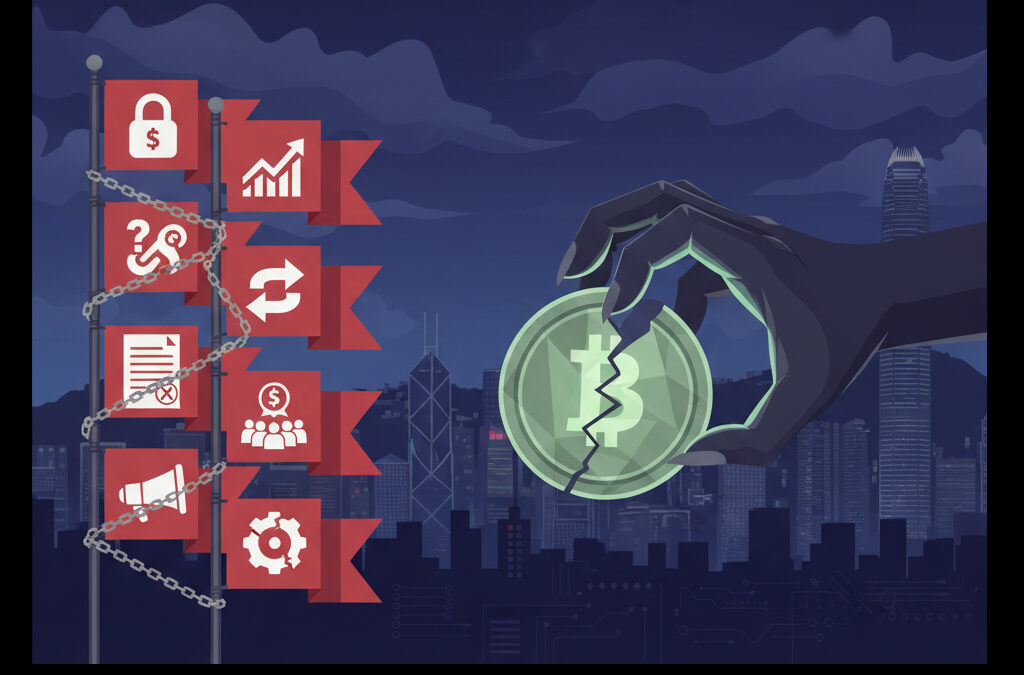Intro
Trading or investing in cryptocurrencies offers exciting opportunities — but also real risks. In Hong Kong we’ve seen a sharp increase in crypto-scam cases: from 2,336 in 2022 to over 3,415 in 2023 alone, with losses totalling billions of HKD.
It’s not just “bad luck” if you fall into a scam; often there are six key warning signs that your counter-party, platform or token offering is unsafe. At TITUS, we help startups, fintechs and SMEs pre-empt fraud — and if you’ve already been caught, we can assist to seek to recover your assets or defend you.
Here are the six red flags you must check. If you spot any one of them, pause and get legal advice before doing anything else.
1. The Platform or Token is Unlicensed / Unauthorised in Hong Kong
One of the most consistent themes in crypto-scam investigations in Hong Kong is that the platform or token offering was either unlicensed or falsely claimed licensing. The Securities & Futures Commission (SFC) has warned investors about entities impersonating licensed platforms, or platforms that claim to be “approved” when they are not.
What to check:
- Is the platform listed on the SFC’s register of licensed Virtual Asset Trading Platforms (VATPs)?
- Does the token issuer claim rights or features that seem too good to verify?
- Are the trading terms transparent and clearly documented?
If you answer “no” or “not sure”, proceed with caution.
2. The Deal Appears “Too Good to Be True”
High returns, guaranteed profits, or ultra-low risk offers are classic scam triggers. Over and over in Hong Kong we see fraudsters use these promises to lure victims.
What to check:
- Are you being promised fixed returns or profits irrespective of market risk?
- Is the platform emphasising urgency (“limited time only”, “act now”) or pressuring you to invest higher amounts quickly?
If yes, red flag.
3. Payment Origin or Payer Changes During the Transaction
In many scam or money-laundering scenarios, the account that sends funds is not the originally agreed account — e.g., a “partner” account or another wallet suddenly pays. As discussed by our Senior Counsel in earlier analysis, this is a major hazard.
What to check:
- Are you receiving funds from the same payer/account you originally dealt with?
- Is there any request to split payments or use third-party accounts?
If yes, this introduces additional risk and complicates tracing/defence.
4. Lack of Transparency or Documentation
A legitimate trading relationship will have clear terms, identity verification, audit trail and transparent settlement. Scams often skip these steps deliberately. The SFC-AMLO framework highlights weak or absent due diligence in VA-related services as a key risk.
What to check:
- Do you have written confirmation of the transaction terms (token type, price, settlement method)?
- Has the counter-party completed KYC or provided business identity/corporate records?
- Are you able to withdraw or reclaim funds if needed?
If any of these are missing, pause and ask questions.
5. Platform or Project Uses Influencers / Social Media “Hype” Without Substantive Details
Fraudsters often deploy high-profile influencers, social-media marketing, flashy graphics and high-pressure campaigns to generate FOMO (fear of missing out). The SFC has flagged this trend.
What to check:
- Is the platform advertised heavily via social media but lacks transparent credentials?
- Are you being encouraged to recruit friends or pay “administration fees” before withdrawal?
- Is the project’s team anonymous, or without verifiable track record?
If yes, strong caution warranted. - Is the initial call a cold call on a random matter that over a period moves to investment advice?
If yes, strong caution warranted.
6. Withdrawal Difficulties, Sudden Change of Terms, or Payer/Platform Freezes
Once funds are in, many scam platforms change terms, impose high fees for withdrawal, redirect you to other accounts, or freeze the platform entirely. Hong Kong authorities have noted this in recent sweep cases.
What to check:
- Are you being told you must pay additional “unlock” or “administration” fees before you can withdraw?
- Have withdrawal terms changed after you invested?
- Has the platform or counter-party become unresponsive, or asked you to move funds out via wallet links you haven’t used before?
If yes, you may already be in a trap — consult legal help immediately.
What to Do If You Spot One (or More) of These Red Flags
- Stop any further payments or token transfers.
- Document everything immediately: chat logs, transaction records, wallet addresses, bank payment receipts. These will form your defence/due diligence file.
- Consider contacting legal counsel (like TITUS) to assess your exposure and prepare a safe next step.
- Do not rely solely on the idea “I’ll just withdraw later” — once funds are transferred, traceability and recovery become much more difficult.
- If you believe you have already been impacted (withdrawal freeze, funds locked, police contact), act fast and seek legal advice. The longer you wait, the more complex the situation becomes from a legal/regulatory standpoint.
Why TITUS Is the Right Legal Partner for These Situations
At TITUS, we specialise in fintech, token-offerings, and cross-border crypto legal advice — while also offering strong dispute/defence capabilities when things go wrong. Our team understands how banks, exchanges, regulators and law enforcement approach crypto matters in Hong Kong. If you suspect a scam, face a withdrawal freeze, or want to do pre-deal due diligence, we offer a tailored service to protect you or your business.
Call to Action
If you’re unsure about a token deal, have detected any of the six red flags, or already face a freeze or investigations, contact us now.
- WhatsApp: +852 9720 3003
- Tel: +852 3702 0045
- Email: hello@titus.com.hk
Address: Suite 4002, 40/F, Lippo Centre Tower 1, 89 Queensway, Admiralty, Hong Kong

